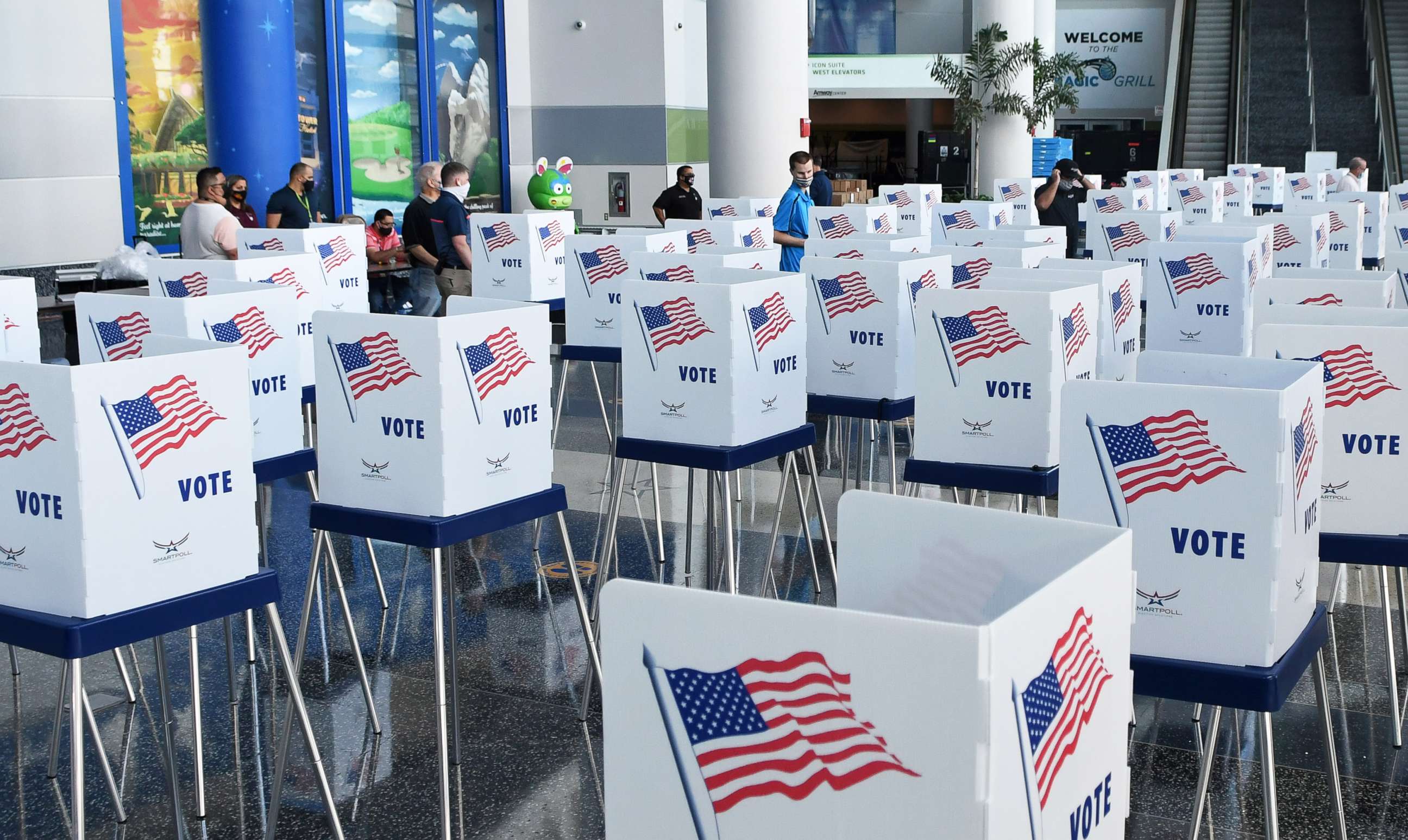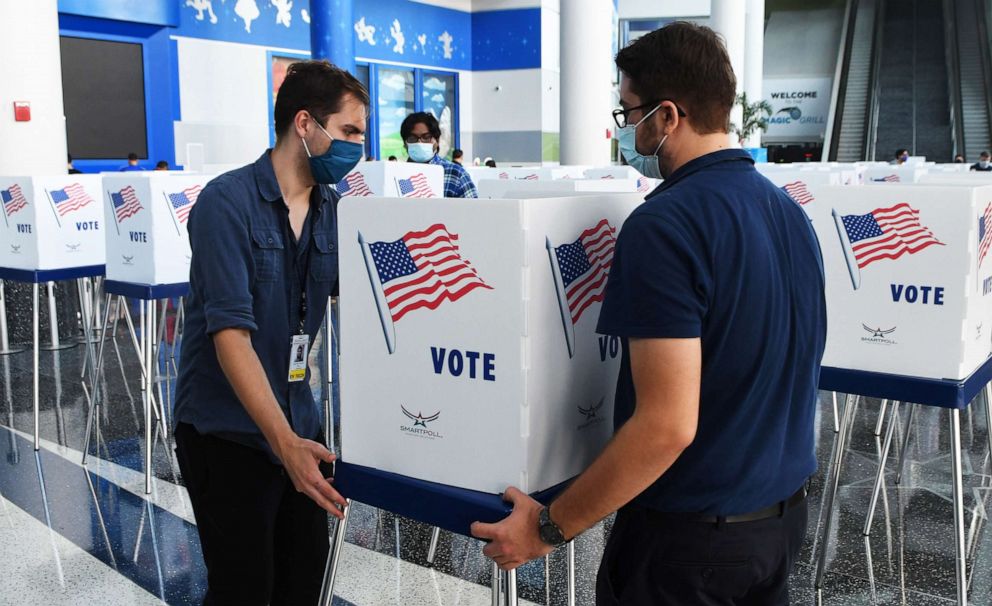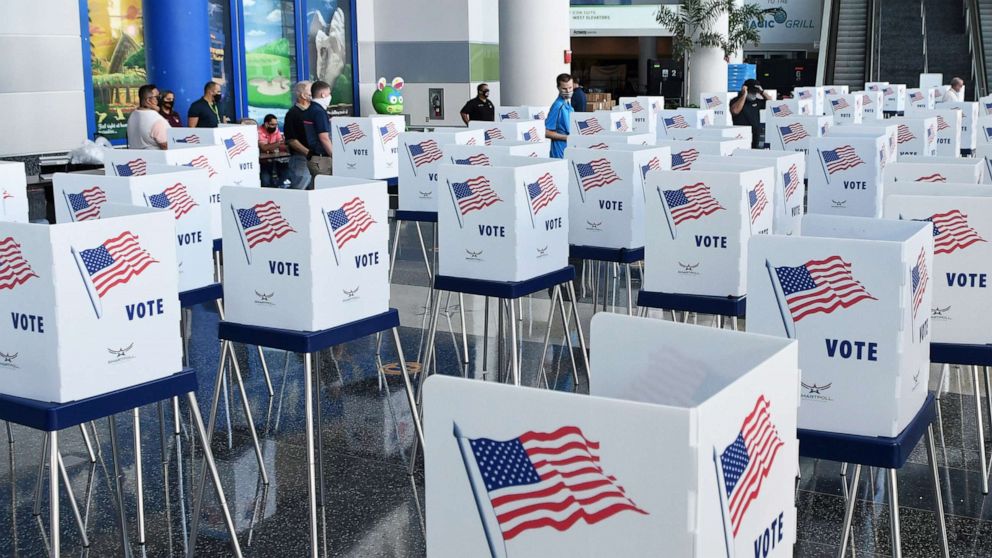Florida begins in-person voting with over 2 million votes already cast by mail
As in-person voting begins Monday in Florida, 52 of the state's 67 counties are opening their polling sites to an electorate eager to determine the outcome of one of the nation's most critical battlegrounds.
As of Sunday, a staggering 2.5 million Floridians had already cast their ballots by mail -- only 200,000 shy of 2016's entire vote-by-mail total -- with 16 days still left to vote. But in the state, most polls still show a tight contest between President Donald Trump and former Vice President Joe Biden.
The high number of absentee ballots has some Florida election officials expecting shorter-than-usual lines at the polls, days after voters in other states, including neighboring Georgia, waited hours at some precincts to vote in person.
"We rarely have lines during early voting as it is, so this is likely to be even less, simply because of the fact that so many voters are now voting from the kitchen table," Steve Vancore, a spokesman for the Broward County Supervisor of Elections, told ABC News.
Democrats have cast nearly 470,000 more absentee ballots than Republicans -- a shocking turn of events for a state where Republicans typically vote by mail at higher rates than Democrats.
"Biden's supporters in large part have already voted or are in the process of voting, which makes it a lot easier at the end to target a smaller number of people that you actually still need to turn out," Tom Alte, a Democratic consultant, told ABC News.
"Trump's problem is that he's got a lot of his voters voting on Election Day. So, he's got to get them all out at the same time, and unless he has already identified them and gotten a commitment that they're going to vote, they have to go after all of them," he added.

Still, Democrats should expect a surge of Republicans at the polls in the last days of voting, according to Susan MacManus, distinguished professor emerita of political science at the University of South Florida.
Democrats' advantage in absentee voting "doesn't mean that the people who might have voted by mail that are old are not going to vote," she told ABC News, referring to a demographic that turned out in large numbers for Trump in 2016. In fact, an ABC News/Washington Post poll conducted last month found that 76% of likely voters in Florida who planned to cast their ballot in person on Election Day supported Trump.
Trump and Biden have used recent visits to Florida to mobilize their bases, going to communities that already show them broad support but whose voters they need to turn out in large numbers if they want to win the state.
Trump held events Friday in Lee and Marion counties, both of which he won by at least 20 points in 2016, while Biden has made two recent trips to South Florida, home to the state's largest swath of Democratic voters.
"So far, no matter what people say, it's definitely a base election," said MacManus. "The question now is turnout."
There have been indications that both candidates are struggling with key constituencies. Recent polling in Florida shows Trump trailing Biden among voters age 65 and over, while Biden is struggling to match former Secretary of State Hillary Clinton's 2016 margins with the state's Hispanic voters.
MacManus also thinks it's no guarantee that younger voters, who polls suggest overwhelmingly prefer Biden, will turn out strongly enough for the former vice president.
"I'd rather be Trump, relying upon the tried and true rural voters. They're high turnout, always," she said.
A potential game-changer that entered the fray in Florida this fall is former New York Mayor Michael Bloomberg, who last month promised an investment of $100 million to help turn out Democratic votes.
Much of that money has gone toward television ads, including a $40 million ad buy he made through the Bloomberg-funded Independence USA PAC in late September.
His most recent investment, last week, was a donation of $2.4 million to help Latino Victory Fund, a progressive PAC, turn out Hispanic voters in Florida.
"Voter turnout among Latinos in Florida could mean the difference for a Biden-Harris win in Florida," said Bloomberg in a statement.
Experts in the state say Bloomberg's investment -- while it arrived late in election season -- could still pay dividends in a state typically won on the margins.
"Just half a percent can make a difference in our state," said MacManus.

Election officials say they are prepared to navigate the hurdles posed by COVID-19 as in-person voting begins, particularly after holding primary elections in August under similar conditions.
"We're not doing anything differently than we did in the primary," Alan Hays, supervisor of elections for Lake County, told ABC News. "Our workers have shields and masks and the voters are welcome to wear whatever protective equipment they want to wear."
Vancore, of Broward County -- which has a county-wide mask mandate -- said the county ordered 500,000 extra masks to offer voters at the polls, and Chris Anderson, supervisor of elections for Seminole County, said he plans to personally disinfect all eight early voting sites after they close at night.
All three counties said they have plans to ensure social distancing at polling locations.
Election officials also say they're ready to handle any disturbances that poll watchers might present. In previous interviews with ABC News, some experts expressed concerns that poll watchers, organized by campaigns to observe the voting process at polling sites, could intimidate voters, citing language by the Trump campaign that describes its poll watchers as part of an "army."
According to Florida statute, each party is allowed one poll watcher per voting site, whose job is to "watch and observe the conduct of electors and officials" but "may not interact with voters."
Anderson told ABC News he has never had issues with poll watchers, but acknowledged that "it's never been as passionate of a position."
"There's only so much they can do," he said. "If they are disruptive... if they cause any problems, they are gone."
While in-person voting is just starting in Florida, election workers have already begun processing absentee ballots, as permitted by state law, which means the state should have most mail-in ballots already counted by the time polls close on November 3.
Since some other battlegrounds -- like Pennsylvania, Michigan and Wisconsin -- must wait until Election Day to begin processing vote-by-mail ballots, Florida could be one of first key states to have a declared winner.
Here's a state-by-state guide to voting in the age of COVID-19.




